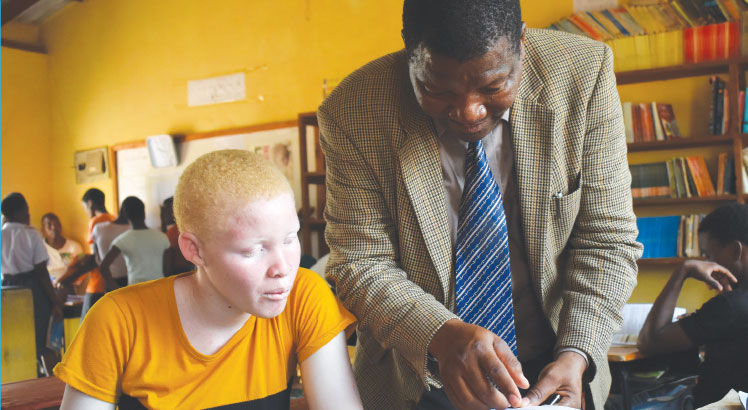On a sweltering Thursday afternoon at Ngabu Secondary School in Chikwawa District, Deborah Issa cannot wait to join a group of classmates discussing the day’s biology lesson.
The ‘star circle’ allows learners to discuss what they learned in the morning, including what they might have missed.
“I work hard in biology alongside chemistry, English and Chichewa. I want to become a doctor, so I have to understand how living things and chemicals work and how to communicate with ordinary people,” she says.
The girl with albinism appears determined to excel. For her, education is more than just securing a better future but also challenging the myths and misconceptions that leave persons with albinism hunted for body parts.
Deborah (L) gets biology tips from headteacher Kaitano
She was selected to Ngabu Secondary School in 2021 amid discriminatory attacks on persons with the inherited condition associated with having pale skin, hair and eyes.
Deborah is on a Unicef Malawi scholarship with support from the Kids in Need of Desks (Kind) Fund, founded by US television host Lawrence O’Donnell and Unicef USA.
Deborah, now in Form Three received the scholarship on arrival in Form One, months after her mother’s death. It includes school fees, notebooks, pens, a uniform, a school bag, reusable sanitary pads and other educational props.
“With the scholarship, I feel safe. Since I learn in peace, I can dream bigger and show that I am human like everyone around me,” says Deborah.
“If more persons with albinism learn and become reliable citizens, many Malawians will understand that the skin condition does not make anyone a lesser being or a lucky charm.”
The Association of Persons with Albinism reports that at least 170 people have been killed or attacked since 2014.
The figures frighten Deborah and her two siblings with albinism.
“At home, my brother, sister and I stopped going out to play with our peers, except in the company of our trusted relatives,” she states. “Here, I live and learn safely because my fenced boarding school has guards day and night.”
With the scholarship, she does not have to worry about “being sent back to the harsh community”.
“When I got the news from the head master, I felt relieved because my dad struggles to raise school fees for my brothers and sisters. I don’t miss classes like my schoolmates sent back to collect fees,” she says.
The school, opened in 1995, has a resource centre for children with special needs, including visual impairments.
Deborah, who has low vision, is satisfied with the support she gets from both teachers and learners.
“When I was selected to this school, I immediately applied for a transfer to escape high temperatures. After a three-month term here, the Ministry of Education transferred me to Mwanza, but I declined because I felt safer here and our teachers caringly assist me and other learners with special needs,” she says.
The school enrols 341 boys and girls. They include 44 with special needs, according to headteacher Nixon Kaitano.
“The scholarships help vulnerable children remain in school and improve their chances in life. Most of them are intelligent but cannot afford school fees since farming—the main source of income and livelihoods in our Shire Valley region—is frequently disrupted by floods, cyclones, drought and prolonged dry spells.”
Disasters in the Shire Valley have become more frequent and devastating with climate change. The most devastating include flooding induced by El Nino in 2015, Cyclone Idai in March 2019 and Tropical Storm Ana and Cyclone Gombe last year.
In March this year, the floodplain across Chikwawa and Nsanje was hit hard by Cyclone Freddy which claimed 679 lives from at least 2.2 million people across southern Malawi. More than 659 000 people were displaced and over 530 were declared missing.
“Chronic disasters leave low-income families too poor to keep children in school. Currently, we have a waiting list of 15 Form One students who may drop out if they don’t get external assistance,” says Kaitano.
Last year, Ngabu Secondary School had 161 learners on scholarships. Unicef supported 54, including those with special needs.
“The scholarships support learners with special needs to keep their dreams alive while reducing inequalities, stigma and discrimination. Every child has a right to learn regardless of financial status and body condition,” says the headteacher.
Concurring, Deborah says the scholarship has strengthened her zeal to excel and safety from ritual killings targeting persons with albinism.
“When Dad warned my siblings and me against hanging outdoors, I asked him: Why are we being hunted for our parts like wild animals? Spending a full term in school gives me a sense of security.”
The post ‘I learn with peace of mind’ appeared first on The Nation Online.
 Moni Malawi
Moni Malawi 

